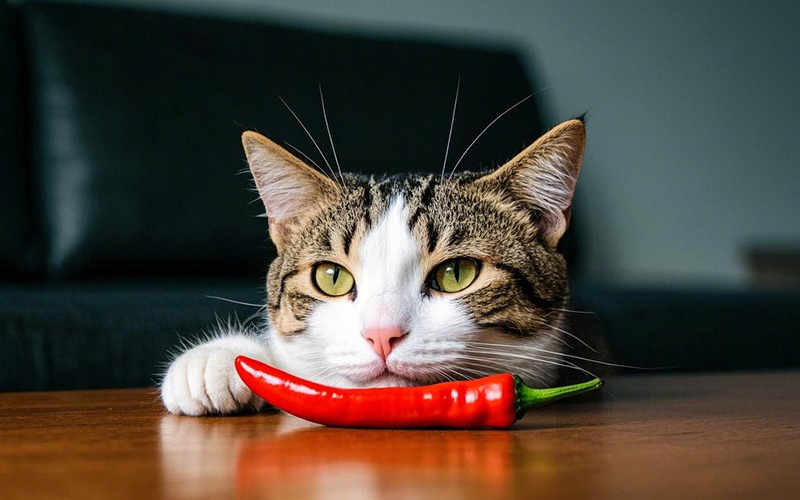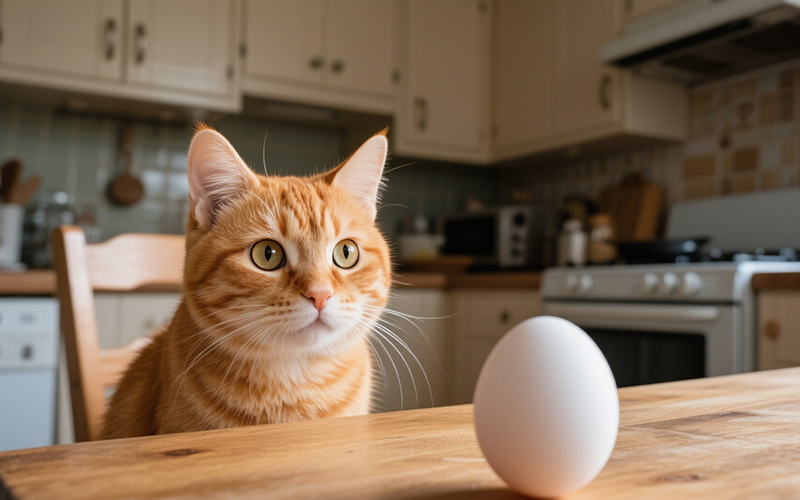Can Cats Eat Peppers? The Safety and Risks of Feeding Peppers to Cats
- 13 Mar 2025 11:40
As a pet owner, you may wonder if it’s safe to share some of your favorite vegetables with your furry friend. One commonly asked question is, “Can cats eat peppers?” While some vegetables are perfectly safe for cats to enjoy in small quantities, peppers (both bell peppers and spicy varieties) can be a bit more complicated.
Let’s break down whether peppers are safe for cats, the potential risks, and what to do if your cat eats them.

Are Peppers Safe for Cats? 🐱
In general, bell peppers (the mild, sweet variety) are not toxic to cats. In fact, they contain some beneficial nutrients, such as vitamins A and C, which are essential for maintaining overall health. However, just because bell peppers are non-toxic doesn’t mean they should be a regular part of your cat’s diet.
Key Considerations:
Digestive Sensitivity 🌱: Cats are obligate carnivores, meaning they thrive on a diet rich in animal proteins. Their digestive systems are not designed to process plant-based foods in large quantities, so feeding peppers to cats may cause digestive upset, including vomiting or diarrhea.
Spicy Peppers 🌶️: Spicy peppers, such as chili peppers or hot peppers, should never be given to cats. These peppers contain capsaicin, a compound that can cause pain, irritation, and gastrointestinal distress. Capsaicin can lead to symptoms like drooling, vomiting, and abdominal discomfort, which are not only unpleasant but can also be harmful to your cat.
Choking Hazard 🔴: While bell peppers are soft, the seeds inside can pose a choking hazard to cats. If you decide to offer peppers as an occasional treat, be sure to remove the seeds and cut the pepper into small, manageable pieces.
Benefits of Bell Peppers for Cats 🍴
While peppers should not be a staple of your cat’s diet, they do have a few health benefits when offered in moderation:
Vitamins A and C: Bell peppers are rich in both of these essential vitamins, which can support your cat’s immune system, skin health, and vision. However, keep in mind that cats typically get sufficient vitamin C from their regular diet, so they don’t require large amounts from foods like peppers.
Fiber: The fiber in peppers can aid in digestion, but cats typically get more than enough fiber from their protein-rich diet. It’s essential to avoid offering large amounts of peppers, as the excess fiber could upset their stomach.
Risks of Feeding Peppers to Cats 🚨
Although bell peppers are not toxic to cats, there are several risks associated with feeding them:
Digestive Issues 🤢: Since cats are not used to eating a plant-based diet, introducing foods like peppers can lead to gas, bloating, or other digestive issues. Some cats may have more sensitive stomachs and could experience more severe reactions.
Allergic Reactions 🐾: Some cats may be allergic or sensitive to certain fruits or vegetables, including peppers. If you notice symptoms like itching, swelling, or hives, discontinue offering peppers and contact your veterinarian.
Toxicity of Hot Peppers 🌶️: Hot peppers, such as jalapeños, habaneros, or chili peppers, contain capsaicin, which is toxic to cats. Ingesting hot peppers can cause a range of issues, including burning sensations, painful mouth irritation, vomiting, drooling, and severe gastrointestinal distress.
Choking Hazard from Seeds 🧩: The seeds inside a bell pepper can pose a choking hazard, especially if they’re not removed before offering the pepper to your cat.
What to Do If Your Cat Eats a Pepper? 🐾
If your cat eats a small amount of bell pepper, there’s usually no need to panic, as it’s unlikely to cause severe harm. However, you should still keep an eye on your cat and look out for any symptoms of discomfort or illness. If your cat eats a spicy pepper, immediate action is necessary.
Monitor for Symptoms 👀: After your cat eats any type of pepper, watch for signs of digestive upset, such as vomiting, diarrhea, or excessive drooling. If your cat shows signs of distress, contact your veterinarian.
Seek Veterinary Help 🏥: If your cat eats a spicy pepper or large amounts of bell pepper, it’s best to reach out to your veterinarian for advice. Spicy peppers can cause severe reactions, and it’s important to ensure your cat gets the necessary treatment if needed.
Provide Fresh Water 💦: If your cat has eaten a spicy pepper, offer fresh water to help dilute the irritation caused by the capsaicin. Be patient and allow them time to recover.
Healthier Alternatives to Peppers for Cats 🐟🍗
If you’re looking to treat your cat with something nutritious, there are many safer and healthier alternatives to peppers:
Cooked chicken or turkey 🍗: These protein-rich meats are excellent for cats and provide the nutrients they need without the risk of digestive issues.
Fish 🐟: Cats love fish like salmon or tuna, which provide healthy omega-3 fatty acids.
Catnip 🌿: Many cats enjoy catnip, which can provide mental stimulation and entertainment without any harm.
Carrots (in moderation) 🥕: If you want to give your cat a crunchy treat, cooked carrots are a safer alternative that many cats enjoy.
Preventing Accidental Ingestion of Peppers 🍴
To keep your cat safe from peppers, follow these tips:
Store Peppers Properly 🛑: Keep peppers, especially spicy varieties, out of your cat’s reach in sealed containers or cabinets.
Be Mindful When Cooking 🍳: If you’re preparing food that includes peppers, be sure to keep them away from your cat. Always remove any seeds and cut peppers into small pieces before offering them to your cat.
Educate Household Members 👨👩👧👦: Make sure everyone in your home is aware that peppers, especially spicy varieties, are not suitable for cats. This includes family members, friends, or guests who might offer food to your cat without realizing the risks.
PettureX: Your Pet Health Assistant 🐾💻
If you’re ever unsure about what foods are safe for your cat or have concerns about your pet’s diet, PettureX is here to help. This AI-powered pet health assistant offers 24/7 consultations, providing real-time advice and guidance on pet health.
Conclusion: Can Cats Eat Peppers? 🚫
In short, bell peppers are not toxic to cats, but they should only be offered in moderation and without seeds. Spicy peppers, however, should be completely avoided, as they contain capsaicin, which is harmful to cats and can cause significant discomfort.
When introducing any new food into your cat’s diet, it’s essential to do so cautiously. If you have any doubts about whether a certain food is safe for your cat, always consult with your veterinarian.
Related

Can Cats Eat Egg Yolk Raw? A Vet's In-Depth Guide to Feline Nutrition & Safety
- 10 Jun 2025
Can Cats Eat Dog Kibble? Unpacking the Nutritional Mismatch!
- 29 May 2025
Can Cats Eat Deli Turkey? Slicing Through the Facts for Your Feline!
- 29 May 2025
Can Cats Eat Deer Meat? Exploring Venison for Your Feline!
- 28 May 2025
Can Cats Eat Corned Beef? Unpacking This Salty Human Delicacy!
- 28 May 2025
Can Cats Eat Cooked Rice? The Grain Truth for Your Feline Friend!
- 27 May 2025
Can Cats Eat Cornbread? A Crumb of Truth for Curious Cat Owners!
- 27 May 2025
Can Cats Eat Cooked Meat? Sizzling Facts for Your Feline's Feast!
- 26 May 2025
Can Cats Eat Chili? Spicing Up the Truth About This Human Dish!
- 26 May 2025
Can Cats Eat Chicken Eggs? Cracking the Code on This Feline Food Query!
- 24 May 2025
